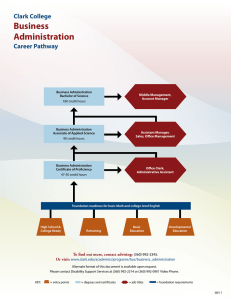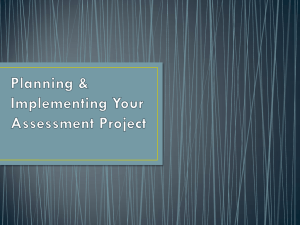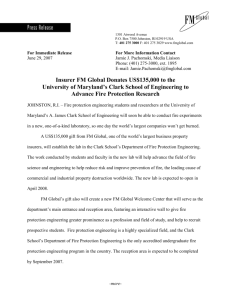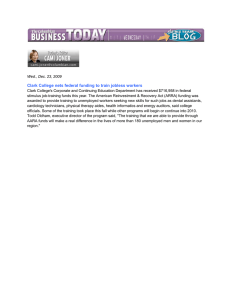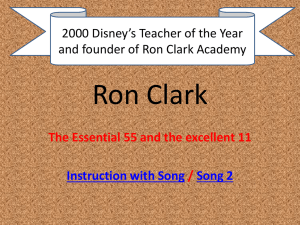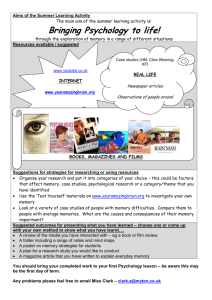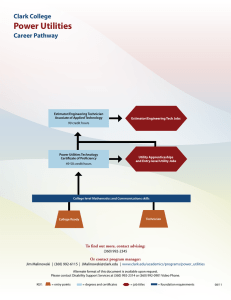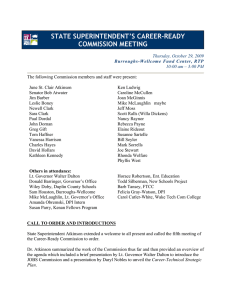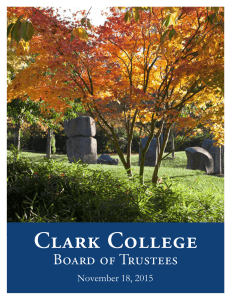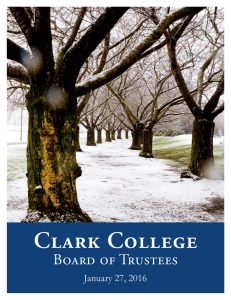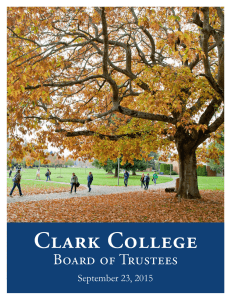CREATING YOUR COMPREHENSIVE ASSESSMENT PLAN Ann Fillmore
advertisement
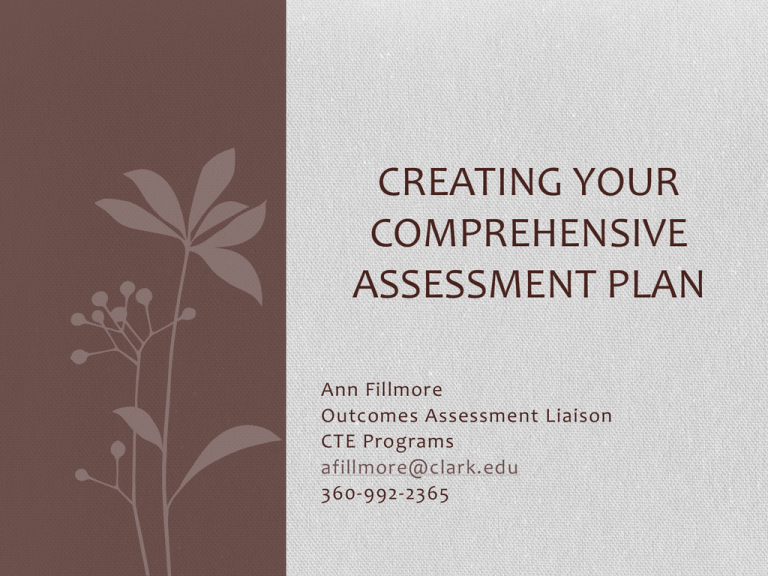
CREATING YOUR COMPREHENSIVE ASSESSMENT PLAN Ann Fillmore Outcomes Assessment Liaison CTE Programs afillmore@clark.edu 360-992-2365 Today’s Objectives We will discuss: • The purpose of an assessment plan • The elements involved in creating your plan • How to create an assessment plan First Things First • Who you are? • Why you are here? • What does your department/program want to achieve? • Do your department/program have an assessment plan? Outcomes Assessment: • Ongoing / continuous process • Designed to improve student learning • NOT an evaluation of faculty members, students, programs, or courses • Is useful • Shows and demonstrates that students are ready to succeed in the real world • Helps us to move from stories to data (based in fact) Assessment Cycle Plan •Develop a plan for the academic year •Incorporate changes suggested from last year’s plan Assess •Collect assessment data •Analyze results Improve •Decide how assessment results should be used to improve program •Implement changes to improve student learning • Understanding the cycle is key to making it work for you! • Assessment should be meaningful, manageable, measureable, and sustainable What is an Assessment Plan? A document that outlines: • The learning outcomes for departments or programs • The assessment methods used to demonstrate the achievement of each outcome • The timeframe for collecting and reviewing the data (Complete program assessment should occur over a 5-7 year period) • The individual(s) responsible for the collection/review of data Why do We Need an Assessment Plan? Purpose • Provides a picture of what has been accomplished and what needs to be done • Enhances the effectiveness of programs • Facilitates process/documentation of outcomes assessment activities • Breaks down assessment cycle into simpler tasks • Helps to guide decision-making • Helps to identify where support is needed What is Included in an Assessment Plan? There are no set rules for how to construct an assessment plan for your department/program Typical Plans Include: • Which outcomes are to be assessed each year • When each outcome is to be assessed • What evidence/samples of student work will be collected • How you will collect evidence • When and where student work will be collected • Who will collect student work, analyze data, and summarize results/do reporting Plans Should Be Flexible Make it function for your department/program • You don’t need to assess every outcome every year • You don’t need to assess every student • You don’t need to assess every class • You can collect evidence over several quarters, then evaluate • If you have a large group of students • Random sampling Will I Have Time to Assess? • Embedded in course/student work • Anything a student does in a course that counts towards the course grade or degree program • Advantages • • • • Normal part of student work No extra work for faculty and students No extra cost for department Assessment process invisible to students • Added assessments in course/student work • Additional work for students & faculty • Sample may not be representative or present an accurate picture • Ex: standardized test Effective Assessment Plans • Multiple methods of assessment, including direct and indirect • Indirect: Gathering information from students on their thoughts, attitudes, perceptions, in relation to the course/program • Direct: Examining work produced by students to determine whether it meets the course/program outcomes • Faculty should be involved in the process • Assessment results should lead to course/program Improvement and informed decision-making Use the Assessment Planning Template Outcome(s) Assessed Yr 1 Yr 2 Yr 3 Yr 4 Yr 5 How Evidence Evidence to Collected be Collected Demonstrates Outcome Methods of Assessment Methods of Collection Methods of Analysis Resources Needed Faculty Involved Thank You for Attending If you have any questions, please contact: • Outcomes Assessment Liaisons • Ann Fillmore, Assessment Liaison (CTE Programs) • afillmore@clark.edu / 992-2365 • Toby Peterson, Assessment Liaison (Academic Transfer Programs) • tpeterson@clark.edu / 992-2084 • Research and Assessment Professional • Kanna Hudson, Planning and Effectiveness • khudson@clark.edu / 992-2265 • OA Website at: http://www.clark.edu/tlc/outcome_assessment/

